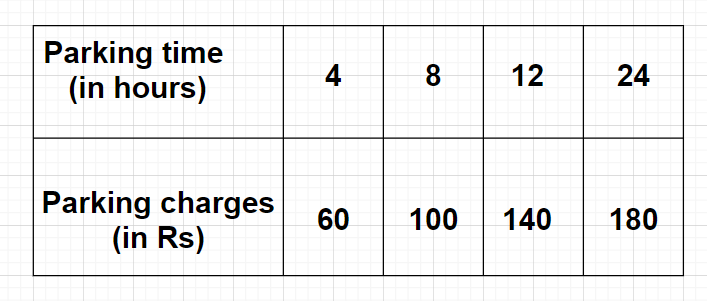
The below table gives the data for car parking charges near a railway station up to the corresponding parking time.

Check if the parking charges are in direct proportion to the parking time.

Answer
620.7k+ views
Hint: Here, we will proceed by finding out all the ratios of the parking charges to the parking time obtained with the help of the given data and then comparing these ratios. If these ratios are equal to each other then only we will be saying that the parking charges are in direct proportion to the parking time.
Complete step-by-step answer:
Corresponding to parking time 4 hours and parking charges Rs 60, the ratio of parking charges to the parking time (in Rs per hour) is $\dfrac{{60}}{4} = \dfrac{{15}}{1} = 15:1$
Similarly, corresponding to parking time 8 hours and parking charges Rs 100, the ratio of parking charges to the parking time (in Rs per hour) is $\dfrac{{100}}{8} = \dfrac{{25}}{2} = 25:2$
Similarly, corresponding to parking time 12 hours and parking charges Rs 140, the ratio of parking charges to the parking time (in Rs per hour) is $\dfrac{{140}}{{12}} = \dfrac{{35}}{3} = 35:3$
Similarly, corresponding to parking time 24 hours and parking charges Rs 180, the ratio of parking charges to the parking time (in Rs per hour) is $\dfrac{{180}}{{24}} = \dfrac{{15}}{2} = 15:1$
Now, for parking charges to be in direct proportion to the parking time all the ratios of parking charges to the parking time obtained must be equal.
But clearly, all the four calculated ratios of parking charges to the parking time are not equal.
Hence, the parking charges are not in direct proportion to the parking time.
Note: Two variables (let it be x and y) are said to be in direct proportion to each other when $x \propto y \Rightarrow x = ky \Rightarrow \dfrac{x}{y} = k$ where k is any constant. This means that any two variables like x and y are in direct proportion to each other only when their ratio is constant or different values of variables x and y always obtain the same ratio.
Complete step-by-step answer:
Corresponding to parking time 4 hours and parking charges Rs 60, the ratio of parking charges to the parking time (in Rs per hour) is $\dfrac{{60}}{4} = \dfrac{{15}}{1} = 15:1$
Similarly, corresponding to parking time 8 hours and parking charges Rs 100, the ratio of parking charges to the parking time (in Rs per hour) is $\dfrac{{100}}{8} = \dfrac{{25}}{2} = 25:2$
Similarly, corresponding to parking time 12 hours and parking charges Rs 140, the ratio of parking charges to the parking time (in Rs per hour) is $\dfrac{{140}}{{12}} = \dfrac{{35}}{3} = 35:3$
Similarly, corresponding to parking time 24 hours and parking charges Rs 180, the ratio of parking charges to the parking time (in Rs per hour) is $\dfrac{{180}}{{24}} = \dfrac{{15}}{2} = 15:1$
Now, for parking charges to be in direct proportion to the parking time all the ratios of parking charges to the parking time obtained must be equal.
But clearly, all the four calculated ratios of parking charges to the parking time are not equal.
Hence, the parking charges are not in direct proportion to the parking time.
Note: Two variables (let it be x and y) are said to be in direct proportion to each other when $x \propto y \Rightarrow x = ky \Rightarrow \dfrac{x}{y} = k$ where k is any constant. This means that any two variables like x and y are in direct proportion to each other only when their ratio is constant or different values of variables x and y always obtain the same ratio.
Recently Updated Pages
Master Class 8 Social Science: Engaging Questions & Answers for Success

Master Class 8 English: Engaging Questions & Answers for Success

Class 8 Question and Answer - Your Ultimate Solutions Guide

Master Class 8 Maths: Engaging Questions & Answers for Success

Master Class 8 Science: Engaging Questions & Answers for Success

Master Class 7 English: Engaging Questions & Answers for Success

Trending doubts
What is BLO What is the full form of BLO class 8 social science CBSE

Citizens of India can vote at the age of A 18 years class 8 social science CBSE

Full form of STD, ISD and PCO

Advantages and disadvantages of science

Right to vote is a AFundamental Right BFundamental class 8 social science CBSE

What are the 12 elements of nature class 8 chemistry CBSE




